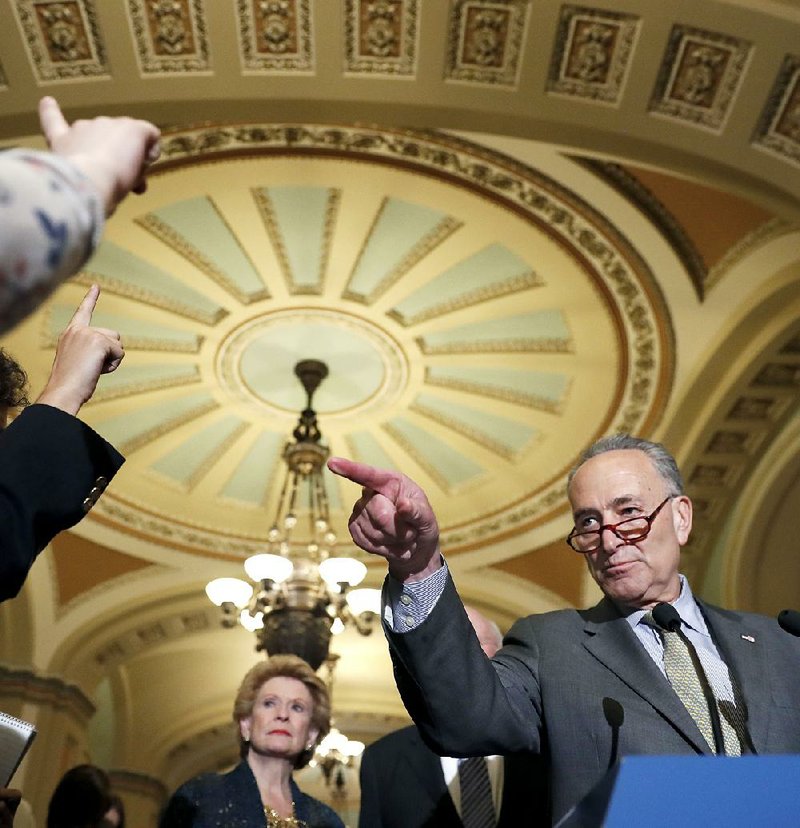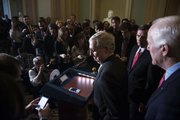WASHINGTON -- Congressional negotiators on Tuesday inched toward a potential agreement on a catchall spending bill that would deny President Donald Trump's request for immediate funding to construct a wall along the Mexico border. The emerging measure would increase the defense budget and eliminate the threat of a government shutdown on Trump's 100th day in office this Saturday.
Top Senate Democrat Charles Schumer of New York said Republican negotiators were following the lead of Trump, who signaled Monday evening that he would not insist on $1 billion worth of wall funding now as an addition to the $1.1 trillion spending bill. Trump told a gathering of conservative media reporters that he might be willing to wait until September for the funding.
Other stumbling blocks remain, but the decision by Trump and his GOP allies to back down on the wall steered the talks on the spending measure in a positive direction.
Senate Majority Leader Mitch McConnell, R-Ky., said he was optimistic the talks would produce "an agreement in the next few days."
[PRESIDENT TRUMP: Timeline, appointments, executive orders + guide to actions in first 100 days]
An existing temporary funding bill expires Friday at midnight and all sides anticipated that another stopgap measure would be required to buy time for the House and Senate to process the massive spending bill, which would wrap together 11 unfinished agency spending bills through September.
Congressional leaders have kept the spending measure under wraps, and with only three days until Friday's deadline to pass it, most members of Congress don't know the details, which could complicate its smooth passage.
Rep. Dave Brat, R-Va., said his constituents don't understand how or why bills are rushed to the floor for a vote in this manner.
"When they ask us in public what you make of the spending bill a week ahead of time and you have to tell them you can't make a full assessment because there is no text, they do not believe it," Brat said Tuesday.
It's not clear when Republican leaders plan to release the text of the spending bill.
Trump campaigned throughout the country last year promising a wall across the entire 2,200 mile southern border, promising that Mexico would pay for it. But while the idea is a priority of Trump's most fervent supporters, it is resolutely opposed by Democrats and even many Republicans, who see it as wasteful and who prefer other steps like new technologies and additional border agents to curb illegal immigration.
"I support additional border security funding," said Sen. Lindsey Graham, R-S.C., a GOP critic of Trump who dined with the president Monday at the White House. "But a 2,200-mile wall, I don't think there's a whole lot of support for it."
Trump vowed to fight for the wall.
"The wall is going to get built," he said Tuesday at the White House. Asked when, he said, "Soon."
He added: "We're already preparing. We're doing plans, we're doing specifications, we're doing a lot of work on the wall, and the wall is going to get built."
When a reporter asked if the wall will be built in his first term, Trump said, "Yeah, we have plenty of time. We've got a lot of time."
Trump counselor Kellyanne Conway further suggested the president may be willing to wait.
"Building that wall and having it funded remains an important priority to him, but we also know that that can happen later this year and into next year, and in the interim you see other smart technology and other resources and tools being used toward border security," she told Fox News on Tuesday.
Trump had told a group of conservative journalists gathered at the White House on Monday that he could put off until September asking Congress to include the money in the federal budget. That could remove, at least for now, one of the biggest deal-breakers he's inserted into talks to pass a bill this week that would finance the government through September, the end of the fiscal year.
The No. 2 Senate Democrat, Dick Durbin of Illinois, said Tuesday that Trump is sending "mixed signals" on the wall and negotiators need clarity to wrap up the bill.
Short-term bill
The spending plan being negotiated this week would keep agencies running through the Sept. 30 end of the 2017 fiscal year. Congress also can head off a shutdown by passing a short-term spending bill to allow time for more talks.
As of Tuesday morning, leaders hadn't posted a bill or announced a House Rules Committee meeting to set procedures for floor debate and a vote.
"This is ridiculous isn't it? We're four days away from a government shutdown," said Rep. Thomas Massie, R-Ky. "My default position is not to vote yes on this bill. I haven't seen it yet."
Massie said the most important function of Congress is to appropriate money for the functions of government. "We've got one job, and I don't think we take it seriously enough."
Trump appeared set to procure about $15 billion to boost the military. Democrats said they were satisfied with the emerging outlines of the measure, which stick closely to versions of the legislation that were being negotiated late last year.
Sen. Patty Murray, D-Wash., observed that GOP negotiators "have simply ignored" a roster of "$18 billion in extreme cuts" offered by White House budget director Mick Mulvaney to lower the measure's cost. The measure would also maintain foreign aid accounts that Trump has targeted, along with a series of grant programs popular with lawmakers in both parties, such as community development block grants.
Several issues remain unresolved. Democrats, with McConnell's help, were pushing to extend health benefits for 22,000 retired Appalachian coal miners and their families whose medical coverage is set to expire at the end of April. Democrats faced White House opposition in an uphill battle to give Puerto Rico help with its Medicaid commitment, while Republicans are pressing policy "riders" to undo new financial regulations from President Barack Obama's era.
Another potential stumbling block involved a recent threat by Trump to scuttle a portion of former Obama's health law that helps low-income people afford insurance policies.
Health subsidy payments, which affect about 7 million Americans, has become the primary sticking point in the talks, aides have said. Democratic leaders demanded that the payments, which are included in the Affordable Care Act but which Trump has said he might not continue, be fully funded in the short-term spending bill to give Congress the power to make the payments.
But some Democrats have signaled a willingness to back down from that demand if the White House commits to continuing the payments on its own. Democrats may also be calculating that, if Trump decides to stop the payments, the near-certain political damage would fall to him.
House Minority Whip Steny Hoyer, D-Md., the second-ranking member of his caucus, said Tuesday that the subsidies should be handled by the White House, not Congress.
"The president has the authority to go ahead and do it. He ought to do it," Hoyer told reporters.
The payments are the subject of an ongoing lawsuit filed by House Republicans, which argues that Congress should have to sign off on the payments. A federal district court ruled last year that the subsidy payments were illegal but allowed the program to continue during the appeals process.
The Senate needs 60 votes to advance legislation, meaning the 52 Republicans will need help from at least eight Democrats. In the House, conservatives led by the Freedom Caucus and other fiscal hawks have regularly bolted on spending bills, and Democrats have provided enough votes for passage.
Meanwhile, House lawmakers returned to Washington on Tuesday evening and faced a renewed push from the White House to revive their beleaguered health care bill in hopes of attracting enough votes to finally push it through the House.
Both efforts come with Congress back from a two-week break just days before Trump's 100th day in office, an unofficial measuring stick of a new president's effectiveness.
Corporate tax cut
Separately, the primary congressional panel tasked with scrutinizing tax proposals has found that a three-year cut in the corporate tax rate would lead to a $489.7 billion drop in revenue over 10 years, creating more head winds for the ambitious tax cut plan that the Trump administration is working to craft.
The finding, presented to House Speaker Paul Ryan, R-Wis., in a letter from the Joint Committee on Taxation, found that cutting the corporate tax rate from 35 percent to 20 percent in 2018, 2019 and 2020 would lead to a decline in tax revenue collected those years by roughly one-third. And tax receipts would continue falling in subsequent years, in part because companies would rush to repatriate money they are holding overseas during the tax holiday. The result would be reduced taxes on those foreign profits in future years.
While Ryan and other House Republicans are advocating a reduction in the corporate tax rate to 20 percent, President Trump wants the corporate tax rate lowered to 15 percent, which would lead to an even bigger drop in revenue, although the Joint Committee on Taxation did not provide an estimate for such a change. The White House is expected to reveal more details of its tax plan today. Trump has directed aides to follow through on a campaign promise and propose lowering the corporate tax rate from 35 percent to 15 percent.
"We note that we project a nonnegligible revenue loss in the tax years immediately following the budget window notwithstanding the temporary nature of the tax reduction," says the letter, which was signed by Thomas Barthold, the Joint Committee on Taxation's chief of staff.
The White House has said that its proposed tax cuts would not lead to an increase in the deficit because it would lead to a boom in economic growth, creating new tax revenue. But when congressional budget scorekeepers evaluate the bill, they won't use that growth assumption to determine whether the legislation will expand the deficit.
Trump administration officials have also said lowering the corporate tax rate will create new incentives for companies to bring jobs back to the U.S., and they have said it will also lead companies to bring trillions of dollars currently being held overseas back to their U.S. headquarters.
The Trump administration has not said what types of new tax changes it might seek to offset the big drop in revenue from rate cuts.
Information for this article was contributed by Andrew Taylor and Alan Fram of The Associated Press; by Billy House, Laura Litvan, Erik Wasson, Anna Edgerton, Alan Bjerga and staff members of Bloomberg News; by Kelsey Snell, Ed O'Keefe, Philip Rucker, David Weigel, Sean Sullivan, Tory Newmyer, Karen Tumulty, Damian Paletta and Max Ehrenfreund of The Washington Post.
A Section on 04/26/2017

